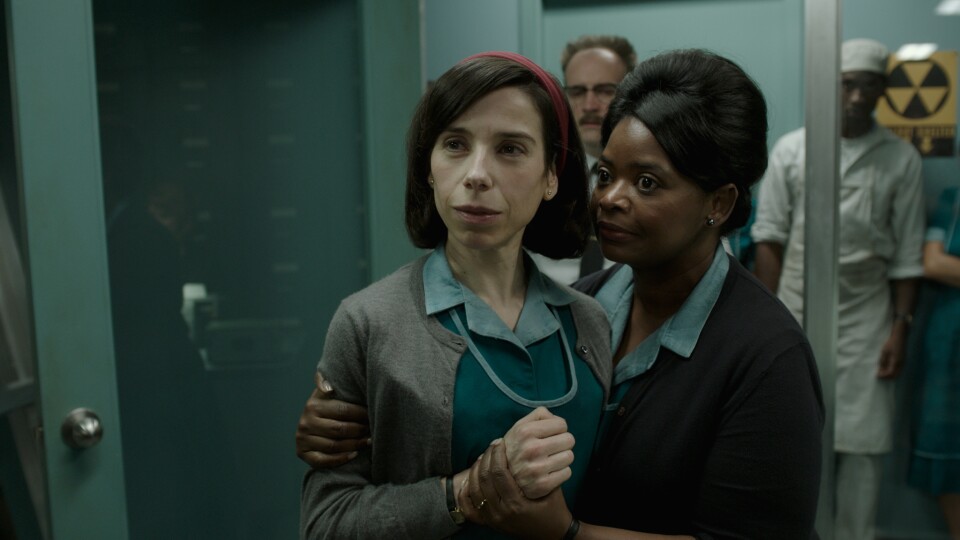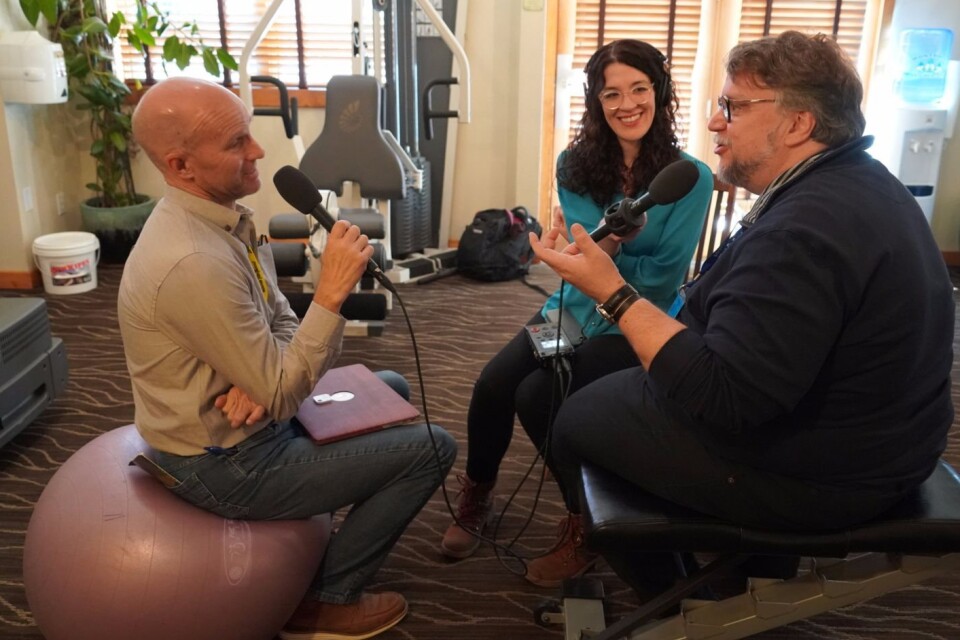The filmmaker debuted his new movie at the Telluride Film Festival — an unlikely love story between a cleaning lady and an amphibious creature being held by the government; DACA recipient Christian Hurtado is included in a documentary about abuse of construction workers in Texas.
Guillermo del Toro's 'The Shape of Water' brings the filmmaker to tears
UPDATE: Guillermo del Toro's "The Shape of Water" won best picture at the 2018 Academy Awards and he also took home the directing trophy.
ORIGINAL STORY: Guillermo del Toro has always been interested in monsters. But unlike a lot of filmmakers, he doesn’t usually cast his creatures as villains. That holds true in his newest movie, “The Shape of Water.”
The film is a sympathetic look at — and even a love story about — a gilled, semi-amphibious creature from the Amazon who becomes the object of romantic fascination by a mute cleaning woman named Eliza (played by Sally Hawkins).
When asked about his choice to make the film's female lead unable to speak, Del Toro is very clear: "I think when you fall in love, love renders you mute. You can tell someone how much you love them all day long, but it's insufficient."

For del Toro, there is a very strong correlation between love and the movies — and its not that far of a stretch to say that all of his films are love stories.
"The essence of love is seeing. That's what love has in common with cinema. When I see you, I grant you your existence as a human being. When I see you as you are. I don't see you as a reporter. I see you as John Horn. I'm giving you a moment of love. This is the most loving thing."
I've interviewed Guillermo del Toro many times, but never in a hotel gym. That's exactly what we did when we caught up between screenings at the Telluride Film Festival. The Hotel Telluride was gracious enough to allow us to commandeer the place as it was the quietest room around to talk with the wildly imaginative filmmaker about his beloved new film. It's a movie that still brings him to tears (more on that later) and which he was willing to sacrifice his pay to make.

INTERVIEW HIGHLIGHTS:
On seeing 'Creature from the Black Lagoon' as a child:
In a strange way, "Creature" is an off-shoot of "King Kong." And "King Kong" is an off-shoot of "Beauty and the Beast" and the fascination with gorillas in the 19th century ... But what I loved about it — I was six years old, watching ["Creature"] on TV and three things awakened in me: one that I shall not disclose; the second one was, I thought it was the most beautiful image I'd ever seen. I had the Stendahl Syndrome moment, in which I was overwhelmed with beauty; and the third one I felt, I hope they end up together. And they didn't ... It took me 40-something years and 25 years as a filmmaker to correct that cinematic mistake.
On his adaptation of "Creature":
That was the point of ["The Shape of Water"] for me: the celebration of otherness, which I think is very timely. Also, the idea that we are controlled by fear right now. We are divided by fear. I wanted to make a movie about love, which sounds disingenuous because right now cynicism sounds smarter.
I happen to say, Let's make a movie that is so full of certain innocence — not stupidity, innocence — and recuperate the notion that love, like water, has no shape, but can cut through everything and take the shape of anything you need.
On crying at his own films:
It happens with "Pan's." It happens with "Devil's Backbone." Funnily enough, it happens with "Hellboy" and it happens with this one. In those movies there is the moment of the Stendahl Syndrome in all of them. There are moments of beauty that are purely cinematic and probably purely affecting me, that move me, because these are things I cannot express with words. Otherwise I wouldn't make movies and it affects me in a very deep way.
On his connections with the characters:
I'm every character, but if I have to choose I'm half the creature and half Sally, because there is a certain enchantment with the way Sally sees the world, which is the way I see movies. So, to me, love and cinema are indistinguishable from each other. And that's what the movie and Sally are about.
On how he relates to actors:
First of all, you tailor the part to them. I wrote it for Sally Hawkins. I wrote it for Michael Shannon. I wrote it for Octavia [Spencer], for example ... I'm tailoring it to their strengths, or what I perceive are their strengths. Then you have three weeks of rehearsal, in which the actor/director relationship is not one. Some actors need a dad. Some actors need a friend. Some actors need an enemy. Some actors need a boss. You get to know them in those three weeks, then you know: This guy needs this, this woman needs this and is reacting to this. You don't talk to them about it, but you know what they need. Those things lift them. They need them in the moment.
Documentary looks at the plight of immigrant construction workers, including DACA recipients
Back in 1996, Christian Hurtado was 14-years-old and living in a small town in Mexico, when his parents told him the family was going to a wedding in Texas.
But what he thought would be a short trip, in reality was a cover for his parents' plans for a permanent move to the United States.
Christian's father got a construction job, and Hurtado eventually started working in construction too — later becoming one of the first undocumented immigrants to receive temporary protection from deportation and a work permit under the Deferred Action for Childhood Arrivals, or DACA, program.
After his father died in an on-the-job accident, and promises from his employer to help with funeral expenses went unfulfilled, Hurtado began advocating for safety protections for all workers, regardless of their immigration status.
As a DACA recipient, Hurtado says, he's felt more free to bring up safety concerns than his fellow undocumented workers without DACA protections.
They think because they're undocumented, they feel afraid to talk about safety. I feel now, some of the guys working in construction who got DACA, now they feel like we will be pushed back to the shadows.
Hearing the news Tuesday of President Trump's plans to end the DACA program in six months, Hurtado says felt like a nightmare.
Hurtado’s story is featured in a forthcoming documentary called "Building the American Dream," about the exploitation of immigrant construction workers in Texas.
The film is directed by Chelsea Hernandez, who joined The Frame via Skype from Austin, Texas. Once audiences see her film, she hopes they will see DACA recipients differently.
DACA recipients are a vital part of communities. I've seen it firsthand in the construction industry. They're the ones building our workplaces, our schools, our roads, our skylines — we need their help. In Texas, there is a huge construction labor shortage and getting rid of of these DACA recipients isn't going to help the situation. They're not taking away jobs in Texas or throughout the country, they're building our nation. And they've been building our country for decades, centuries. So they're just a vital part of our community and our American society.




